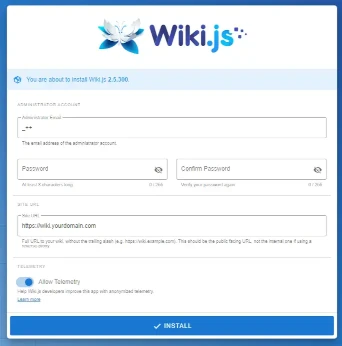Get going with Docker Containers
author : Jon Brookes | created : Dec 22 | updated : Dec 22 | time to read : 4 minutes

TL;DR
edit a run.sh file containing something like this :
docker run -d \
--name=wikijs \
-e PUID=1000 \
-e PGID=1000 \
-e TZ=Europe/London \
-e DB_TYPE=sqlite \
-p 3000:3000 \
-v $(pwd)/config:/config \
-v $(pwd)/data:/data \
--restart unless-stopped \
lscr.io/linuxserver/wikijs:2.5.300
and run it with sh run.sh
access a local wiki.js instance at http://localhost:3000
Get Docker
Installing Docker to Windows, Mac and Linux is straight forward using Dockers product download page
installed and used in conjunction with VSCode
Install and run a container
Lets install an application that is a wiki, a place in which we may store and share information, notes, knowledge base, etc. but this will be for our own, private and local use for now.
wiki.js is a modern, lightweight and powerful wiki app built on Node.js, Git and Markdown. It runs on the blazing fast Node.js runtime environment to provide a powerful wiki app to document your projects, Git repositories, notes, knowledge base, etc.
To do this, we can take a look at hub.docker.com to see the latest tag is at the top. This defaults to be the current, latest version of the container and we can use latest if we want and just let it return to us the current, at time of writing, 2.5.300 however to specify this, we can choose to download this version tag by using it in place of latest
docker pull lscr.io/linuxserver/wikijs:2.5.300
which when run will look something like this ( and will take as long as a few seconds to several minutes depending on your network connection and the size of the container you are downloading )
❯ docker pull lscr.io/linuxserver/wikijs:2.5.300
2.5.300: Pulling from linuxserver/wikijs
8b16ab80b9bd: Pull complete
07a0e16f7be1: Pull complete
145cda5894de: Pull complete
1a16fa4f6192: Pull complete
84d558be1106: Pull complete
4573be43bb06: Downloading [==========================> ] 53.52MB/102MB
20b23561c7ea: Download complete
when this is finished downloading, we can list our local images with
❯ docker images
REPOSITORY TAG IMAGE ID CREATED SIZE
lscr.io/linuxserver/wikijs 2.5.300 869729f6d3c5 7 days ago 441MB
Now we can create a shell script file called run.sh with the following contents
docker run -d \
--name=wikijs \
-e PUID=1000 \
-e PGID=1000 \
-e TZ=Europe/London \
-e DB_TYPE=sqlite \
-p 3000:3000 \
-v $(pwd)/config:/config \
-v $(pwd)/data:/data \
--restart unless-stopped \
lscr.io/linuxserver/wikijs:2.5.300
Be sure to change TZ to your timezone, and change the PUID and PGID to your own user id and group id. You can find these by running the id command in terminal. If you don’t know what your timezone is, you can find it by running the timedatectl command in terminal.
Also, the port 3000 needs changed if you already have something running on that port. To change the port, change the first number in -p 3000:3000 to whatever port you want to use.
We can run the script now:
sh run.sh
025ee830474d95178e330f61192ebec4032891e913aebe8d24a4de9c26a82b2a
When the container is running we can check this with
❯ docker ps
CONTAINER ID IMAGE COMMAND CREATED STATUS PORTS NAMES
025ee830474d lscr.io/linuxserver/wikijs:2.5.300 "/init" 57 seconds ago Up 56 seconds 0.0.0.0:3000->3000/tcp wikijs
There are 2 directories created in the current directory, config and data and these are where the configuration and data for the container are stored :
❯ ls
config data run.sh
Next, open a browser and navigate to http://localhost:3000 and you will be presented with the wiki.js install prompt

As this is for local hosting and development work for now, we can use the following
| Field | Value |
|---|---|
| Administrator Email | your email |
| Password | set your password |
| Confirm | confirm your password |
| Site URL | http://localhost:3000 |
On completion of the install, you will be presented with the wiki.js welome page and call to action to create your first page.
Pages are by default created using Markdown, which is my preference as this translates to other media easily.
We now have a local only, private copy of our own wiki.js instance running in a container on our local machine.
Wikis are great for storing and sharing information, notes, knowledge base, etc. They were amongst the first ways of easily managing knowlege in a way that was easy to add to and modify, even search and index. Before Wikis, often web sites required greater knowledge of HTML and CSS to create and maintain and were not as easy to share and collaborate on. Wikimedia, the company behind Wikipedia, the online encyclopedia, have made history with their work and have made it possible for anyone to create and share information in a way that is easy to use and access. Thankyou Wikimedia.